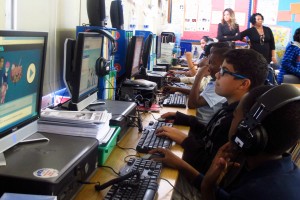Study Finds More Classroom Technology Doesn’t Mean More Learning

John O'Connor / StateImpact Florida
Students at Miami-Dade's Frances S. Tucker Elementary completing personalized lessons using i-Ready software during math class.
The more technology students use in school, the less progress they make on math and reading lessons. That’s the conclusion of a leading international education research group on the use of technology in schools.
The Organization for Economic Co-operation and Development oversees the largest international math and reading exams in the world. The group recently looked at the availability and use of computers and Internet in school and compared it to how those countries were doing on international tests.
One conclusion: the more time students spend online in school, the worse they do. Students with moderate technology use performed best on international exams.
“That’s pretty sobering for us,” said Andreas Schleicher, who leads the OECD’s education efforts. “We all hope that integrating more and more technology in school is going to help us actually to enhance learning environments. Make learning more interactive…but it doesn’t seem to be working like this.”
The OECD found a negative correlation between use of email, chat and digital exercises and student performance.
“Basically, you can say the less computers are used in mathematics lessons,” Schleicher said, “the better students perform.”
The OECD found east Asian nations, including China and Singapore, deliberately restricted students use of computers. Those countries are also among the best performers on international exams.
But the OECD found that connecting teachers through technology has positive effects. Those same east Asian nations that limited student access to computers encouraged teachers to network, chat, video conference, share ideas and observe other teachers online. That collaboration produced better lessons, that were more engaging and customized.
The conclusion is that — like everything else in education — effective use of technology in schools requires wise implementation and teacher training.
And the OECD argues schools should not back off the use of technology in schools since most jobs will require digital skills. U.S. schools had among the best student-to-computer ratios in the world, and U.S. students ranked among the best in the world in a test of digital literacy, the ability to navigate and use the Internet to complete tasks.
